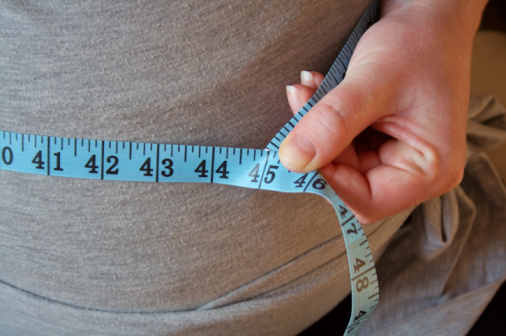10 Reasons to Battle Belly Fat — and How to Do It!
Article posted in: Lifestyle
We’ve all heard the buzz about Body Mass Index (BMI): The higher the number, the greater your risk of disease. But as it turns out, BMI isn’t the only heavyweight worth battling in the fight for better health. Scientists have long held that being overweight or obese increases the risk of many chronic diseases and health complications. In recent years, research has suggested that carrying extra weight around your middle, no matter how thin you may be otherwise, also increases that risk.
There are two kinds of belly fat: subcutaneous and visceral. Think of subcutaneous fat as the “inch you can pinch.” It’s the kind that lies just beneath the skin, and is found all over your body―your thighs, your arms, even the soles of your feet. Although too much of this type of fat can be detrimental, moderate amounts of it are necessary for life. Visceral fat, on the other hand, is found much deeper within your abdomen, and can surround major organs like your heart and liver, disrupting their function and causing health issues. This fat is biologically active, which means it can upset the balance of several hormones and produce substances that cause harm in the body.
So how do you know if you have visceral fat? If you’re overweight, it’s likely that in addition to too much subcutaneous fat you also have visceral fat. But since even individuals who are a healthy weight can have excess belly fat, the best way to determine if you need to trim your tummy is to measure your waist. Research indicates that women with a waist circumference of 35 inches or more, and men with a waistline of 40 inches or more, have unsafe levels of visceral fat.
Here are 10 reasons to start battling the belly bulge today, and how to do it:
1. It harms your heart
Experts contend that visceral fat triggers inflammation that contributes to heart disease. In a 2014 study that followed some 15,000 men and women for nearly 13 years, those with the highest waist-to-hip ratio had more than double the risk of sudden cardiac death compared with those in the normal range
2. It increases your risk for type 2 diabetes
Research indicates a strong association between visceral fat and insulin resistance―a risk factor for type 2 diabetes (T2D). This explains findings like those from a 2008 study published in the American Journal of Clinical Nutrition, in which abdominal fat accumulation was directly linked to a greater risk for developing T2D.
If you’re living with diabetes and looking for healthy weight loss, check out the Nutrisystem diabetic diet >
3. It can increase your cancer risk
According to the MD Anderson Cancer Center, extra belly fat can increase your chances of colorectal, pancreatic, uterine and post-menopausal breast cancers. Scientists contend that the disruption of hormonal balance instigated by visceral fat may be to blame.
4. It can disrupt your ZZZs
The relationship between sleep disorders like obstructive sleep apnea (OSA) and central obesity is a bit like “the chicken or the egg” scenario in that scientists are not clear if excess belly fat is to blame for OSA, or OSA is to blame for excess tummy fat. Still, one thing is clear: Because fat in the abdomen and neck regions can impair upper airway size and function—making breathing difficult—carrying excess visceral fat can be particularly disruptive to sleep.
5. It’s bad for your back, and everything else
Carrying extra weight anywhere on your body can cause added stress on your muscles and joints. Carrying excess weight in your middle can also be particularly damaging to your back. As if that weren’t bad enough, because strained muscles hardly lend themselves to movement, the aches and pains caused by excess belly fat can cause you to become more sedentary―a risk factor for all kinds of other conditions like diabetes, heart disease and obesity.
6. It can fog your memory
Even your brain can’t escape the weight of belly fat. A 2005 study published in The BMJ found that larger bellies in older people were associated with declines in both memory and language. A 2008 study published in Neurology also indicated that central obesity in midlife increases the risk of dementia in later years.
7. It can alter cholesterol levels
Visceral fat is directly linked to higher total cholesterol. It is also associated with higher LDL cholesterol (the bad kind), and lower HDL cholesterol (the good kind). This relationship may be explained by the fact that visceral fat sits very close to a major vein called the portal vein, which carries blood from the intestinal area to the liver. Because of their close proximity, substances released by visceral fat can enter the portal vein and travel to the liver, where they can negatively influence cholesterol production.
8. It can lead to high blood pressure
For many years, experts have understood that being overweight or obese can increase the risk of hypertension (abnormally high blood pressure). In recent years, however, scientists have explored the impact of different types and locations of fat in the body. A 2014 study published in the Journal of the American College of Cardiology that examined the relationship between body fat and blood pressure determined that people with abdominal fat were at greater risk of developing hypertension than people with similar BMIs who carried their fat elsewhere.
9. It can give you a stroke
Informally referred to as a “brain attack,” a stroke occurs when blood flow to a certain area of the brain is cut off, causing brain cell death. A 2008 study in the journal Stroke revealed that waistline and other markers of abdominal fat may be better predictors of stroke than BMI. In this study, participants with bigger waist circumferences―again, more than 40 inches for men and 35 inches for women―had four times the risk of developing a stroke compared to people with more average belly sizes. Individuals with the largest waist-to-hip ratio had almost eight times the risk of developing a stroke or similar condition.
10. It can increase your risk of premature death
Given the multitude of health complications associated with bigger bellies, it’s not surprising that a large 2008 study linked belly fat with premature death. In one of the largest and longest health studies in the world, researchers found that people with the most belly fat had nearly double the risk of dying prematurely compared to those with the least amount of belly fat. The risk of premature death increased with waist circumference, regardless of whether the subjects were overweight or not.
So you know belly fat is bad. But how do you get rid of it? Here’s how to lose belly fat:
1. You pay attention to what you eat
The good news is, just by getting to a healthy weight, you’ll lower your total body fat and, consequently, your visceral fat levels. Since this type of fat responds well to diet, you can minimize it by paying attention to your portions, eating plenty of produce, and sticking with whole grains and lean proteins. Avoid sugary drinks, refined grains (like white pasta or white bread), and trans fats that may be lurking in baked goods. Click here for a list of 6 Foods That Beat Belly Fat.
2. You get moving
People often make the mistake of assuming that belly bulge can be reduced with tons of crunches and sit-ups. Unfortunately, while moves targeting the midsection can help build muscle, and are a good addition to a comprehensive approach, these exercises won’t eliminate fat. Engaging in regular, moderate-intensity physical activity like brisk walking at least 30 minutes a day can help you lose weight and reduce body fat. Just don’t neglect weight training. A 2014 study published in the journal Obesity revealed that healthy men who did 20 minutes of weight training every day had less of an increase in age-related abdominal fat compared with men who spent the same amount of time solely engaging in aerobic activities. However, a combined approach of both weight training and aerobic activity proved most beneficial.
3. You strive for sound slumbers
Finally, focus on your ZZZs. A 2010 study from the Wake Forest University School of Medicine revealed that getting too little sleep—five hours or less—or too much sleep—eight hours or more—is associated with increased visceral fat.
Looking for even more ways to whittle that middle? Here are five more ways to beat belly fat.

















